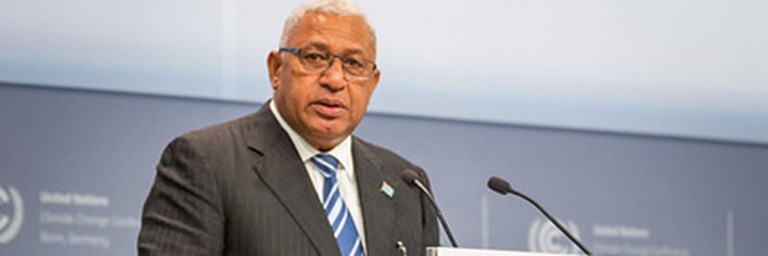An international initiative aimed at providing insurance to 400 more million poor and vulnerable people by 2020 moved into a higher gear with the announcement of additional funding and many more partners.

The InsuResilience Global Partnership for Climate and Disaster Risk Finance and Insurance Solutions, launched on Tuesday, November 14, 2017 at the 2017 UN Climate Conference (COP23) in Bonn, now brings together G20 countries in partnership with the V20 nations.
The V20 is a group of 49 of the most vulnerable countries including small islands like Fiji which holds the Presidency of this year’s conference.
Germany has joined forces with its partners, the Ethiopian Chair of the V20, the United Kingdom and the World Bank, in order to launch this Global Partnership.
“The Global Partnership is a practical response to the needs of those who suffer loss because of climate change. And I am very proud that it has happened under Fiji’s Presidency of COP. At the same time, it is a means of preparing for a more resilient form of development for those who will have to adapt to the great challenge of climate change,” said the COP23 President and Fijian Prime Minister, Frank Bainimarama.
Thomas Silberhorn, Parliamentary State Secretary to the Federal Minister for Economic Cooperation and Development, announced support for the new global partnership of $125 million as part of Tuesday’s launch.
This follows the £30 million commitment made by UK Government in July 2017 to the Partnership via its Centre for Global Disaster Protection.
The announcement comes in the wake of a year of damaging and devastating extreme weather events that have hit countries and communities in Asia, the Eastern Caribbean and the Americas with some of the events described by scientists as unprecedented.
The Global Partnership supports data and risk analysis, technical assistance and capacity building according to countries’ needs and priorities, solutions’ design of concrete risk finance and insurance solutions, smart support for the implementation for such schemes and monitoring and evaluation efforts. This will range from sovereign risk pools in the Pacific, Africa and the Caribbean. The insurance schemes focus on the meso and micro level benefitting smallholders, the urban poor and other vulnerable groups.
The next phase, announced under the Global Partnership, is aimed at meeting the pledge of providing cover and support to an extra 400 million vulnerable people by 2020 while the efforts of the Global Partnership go beyond that original G7 goal.
The InsuResilience Initiative was launched in 2015 by the G7 group of nations under the German Presidency.
Patricia Espinosa, Executive Secretary of the UN Climate Change secretariat, said: “People devastated by recent weather events and communities vulnerable to climatic impacts are looking to the nations meeting in Bonn for an answer, for support and hope for the future”.
“This new and higher ambition initiative represents one, shinning, example of what can be delivered when progressive governments, civil society and the private sector join hands with creativity and determination to provide solutions,” she said.
“This Global Partnership brings important groups like the V20 group made up of those countries most vulnerable to climate change and the G20 group of the world’s strongest economies together around one table so that they can join forces to increase the resilience of poor and vulnerable people to the impacts of climate change. Instead of only reacting to catastrophes we want to shift to planning, preparing and protecting,” said Thomas Silberhorn.
The new Global Partnership comes as the UN Climate Change secretariat has also launched this week an online platform or Clearing House for Risk Transfer under the Paris Climate Change Agreement that will use artificial intelligence to connect countries seeking innovative insurance solutions with countries needing them
In July 2017, at their Summit in Hamburg, the G20 welcomed the creation of a Global Partnership for Climate and Disaster Risk Finance and Insurance Solutions. It is therefore known as the “InsuResilience Global Partnership”.
The aim of the Global Partnership is to increase the resilience of developing countries and protect the lives and livelihoods of poor and vulnerable people against the impacts of climate change and against natural disasters.
Under the framework of the Global Partnership, key players from developing and industrialised countries, international organisations and development banks, the private sector, civil society and the scientific community will work together to develop concrete and practical solutions that will provide financial protection against climate risks and natural disasters.
Innovative finance and insurance solutions for individual countries, which are tailored to the specific needs and challenges of poor members of the population in particular, are to be developed and implemented through the Global Partnership.
The Caribbean Catastrophe Risk Insurance Facility (CCRIF), for example, is being supported with the help of InsuResilience.
The most recent example of support was in September 2017,when more than $55 million were paid out to 10 Caribbean countries within just 14 days after hurricanes Irma and Maria had wreaked disaster on the islands.
The money was used in various ways, for example to quickly buy urgently needed medicines and to build emergency shelters for the people affected by the storms.
In Zambia, InsuResilience supports the NWK Agri-Services cotton company, which offers direct weather and life insurance to small contract farmers.
In 2015, some 52,000 farmers decided to buy insurance. Following a major drought in 2016, more than 23,000 farmers received payments.
On the one hand, the Partnership is meant to enable governments to react faster and more specifically following a natural disaster.
On the other hand, the Partnership is meant to support and enhance the future efforts of governments to prepare to meet risks due to climate change and natural disasters, linking these preparations to the use of risk finance and insurance.
This combination of a fast, targeted response and acting with foresight can reduce the number of humanitarian emergencies, and help poor and vulnerable people get back on their feet more quickly after a disaster has occurred.
